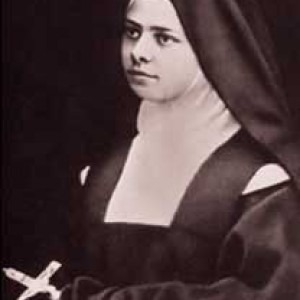Podcast: Play in new window | Download (Duration: 28:04 — 19.4MB) | Embed
Subscribe: Apple Podcasts | Spotify | Amazon Music | Android | Pandora | iHeartRadio | JioSaavn | Podchaser | Gaana | Podcast Index | Email | TuneIn | Deezer | Anghami | RSS | More

Episode 2 “Heaven in Faith” Day 1 Prayer 2 – “Abyss calls to Abyss”
Day 2 Second Prayer
3. “Remain in Me.” It is the Word of God who gives this order, expresses this wish. Remain in Me, not for a few moments, a few hours which must pass away, but “remain . . .” permanently, habitually, Remain in Me, pray in Me, adore in Me, love in Me, suffer in Me, work and act in Me. Remain in Me so that you may be able to encounter anyone or anything; penetrate further still into these depths. This is truly the “solitude into which God wants to allure the soul that He may speak to it,” as the prophet sang.
4. In order to understand this very mysterious saying, we must not, so to speak, stop at the surface, but enter ever deeper into the divine Being through recollection. “I pursue my course,” exclaimed St. Paul; so must we descend daily this pathway of the Abyss which is God; let us slide down this slope in wholly loving confidence. “Abyss calls to abyss.” It is there in the very depths that the divine impact takes place, where the abyss of our nothingness encounters the Abyss of mercy, the immensity of the allof God. There we will find the strength to die to ourselves and, losing all vestige of self, we will be changed into love. . . . “Blessed are those who die in the Lord”!
Elizabeth of the Trinity. The Complete Works of Elizabeth of the Trinity, vol. 1 (featuring a General Introduction and Major Spiritual Writings) (Elizabeth of the Trinity Complete Work) (pp. 94-95). ICS Publications. Kindle Edition.
Discerning Hearts Reflection Questions
We would like to thank Miriam Gutierrez for providing “the voice” of St. Elizabeth for this series
For other episodes in the series visit the Discerning Hearts page for Dr. Anthony Lilles
Anthony Lilles, S.T.D., has served the Church and assisted in the formation of clergy and seminarians since 1994. Before coming to St. Patrick’s, he served at seminaries and houses of formation in the Archdiocese of Denver and the Archdiocese of Los Angeles. The son of a California farmer, married with young adult children, holds a B.A. in theology from the Franciscan University of Steubenville with both the ecclesiastical licentiate and doctorate in spiritual theology from the Pontifical University of Saint Thomas Aquinas in Rome (the Angelicum). An expert in the writings of St. Elizabeth of the Trinity and the Carmelite Doctors of the Church, he co-founded the Avila Institute for Spiritual Formation and the High Calling Program for priestly vocations. He also founded the John Paul II Center for Contemplative Culture, which hosts symposiums, retreats, and conferences. In addition to his publications, he blogs at www.beginningtopray.com .

 Saint Elizabeth’s reflections, as explored by Dr. Lillis, stress the importance of incorporating themes for meditation throughout the day, a practice that aligns with the spiritual exercises developed by St. Ignatius of Loyola. This method of reflection, involving morning and evening prayers followed by meditation, is aimed at fostering a deeper communion with Christ’s transforming love. Elizabeth’s writings serve as a guide for her sister and other believers to internalize divine teachings and apply them to their lives, thereby cultivating a continuous awareness of God’s presence.
Saint Elizabeth’s reflections, as explored by Dr. Lillis, stress the importance of incorporating themes for meditation throughout the day, a practice that aligns with the spiritual exercises developed by St. Ignatius of Loyola. This method of reflection, involving morning and evening prayers followed by meditation, is aimed at fostering a deeper communion with Christ’s transforming love. Elizabeth’s writings serve as a guide for her sister and other believers to internalize divine teachings and apply them to their lives, thereby cultivating a continuous awareness of God’s presence.